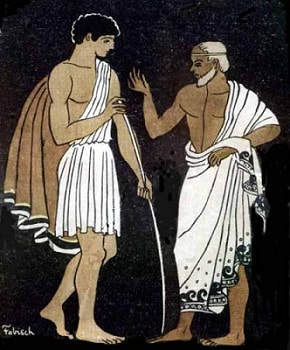Mentor
 THE STORY OF MENTOR
THE STORY OF MENTORHave you ever been mentored? Are you a mentor? Here’s a story about the origin of the word.
Once upon a time there was a king who sailed away with his army to fight in a foreign war leaving his wife and son at home to keep order in the kingdom. During the many years he was away, his wife was plagued by numerous suitors who believed that the king would never return. They conspired and competed amongst themselves to marry her and take over the kingdom. But his clever wife never succumbed to their wiles. She trusted that the king would return.
No one knew where the king was or if he was even still alive. His son, Telemachus, a young man full of vim and vigor but more than a bit idealistic and naïve, became increasingly angry at both his mother for tolerating these suitors and at his father for his absence.
Telemachus had a tutor named Mentor. We do not know much more about Mentor from this story other than that he was a wise old man, and a loyal friend of the king and his family.
One day Telemachus met an old sailor on the beach who suggested that Telemachus take one of his father’s ships and go with some of his friends over to the next kingdom, find some of his father’s friends, join forces, and try and track down his father.
But: here’s the twist in the story. The old sailor was the goddess Athena in disguise. Also, Athena knew that Telemachus would need guidance on his journey so she (as one version of the story says) “put on the appearance of the sage Mentor [and] guided young Telemachus during his efforts to find his father.” Athena was keeping an eye on Telemachus as a favour for her good friend, the king.
What I find fascinating and intriguing about this story is that the goddess Athena, no slouch in the self-esteem department, chose to disguise herself as Mentor in order to guide Telemachus. As told in Greek mythology, Athena, the daughter of Zeus and Metis, was born from the skull of her father, clad in full armour and shouting a war cry. She was considered the equal of her father in strength and wisdom. She was called the virgin goddess: “In all things,” she said, “my heart leans towards men, except in marriage.”
She was also called the warrior goddess, using strategy, ambush, cunning and magic to achieve her purposes. She was against excess in daily life, teaching men to conquer their savagery, tame nature, and master the elements. She was the patron of weavers, horsemen, blacksmiths, shipbuilders, foresters, and carpenters. She invented the chariot. The city of Athens is named after her.
So: why would Athena choose to disguise herself as an old man, as Mentor? Why not just send Mentor himself with Telemachus? Why are Mentor and Athena embodied in one person in this story? What is the ancient storyteller trying to tell us? What might this story tell us about mentor and mentoring? Any ideas?!
I’ll let you read the rest of the story for yourself. Sex and violence are involved.
The story, as you may know, is The Odyssey. Homer, who may have been one or several writers, composed two major works in the 8th century BCE—The Iliad and, its sequel, The Odyssey. The Iliad tells the story of the ancient Greeks and the Trojan War. One of the heroes of The Iliad is Odysseus (or Ulysses, as he is known in Latin), the king who is the father of Telemachus and the husband of clever and faithful Penelope. The Odyssey tells of Odysseus’s journey and eventual return home to his family after the war. I recommend the translations by Robert Fagles.
The etymology of mentor
The word mentor has its origins in the Proto-Indo-European root men (to think) which is the source of Sanskrit man-tar (one who thinks), Hindi mantra (a chanted hymn or prayer), Greek mentos (intent, purpose, spirit, passion), and the English word ‘mind’. The word mentor comes to English in 1750 from The Odyssey and means wise advisor, sage counsellor, and perhaps intimate friend. To be a mentor, that is ‘to mentor’ someone, is from 1888.
Mentor is also related to words such as monitor and Latin mandare (to command), the source of mandate, and mandarin (a high government official).
Reference: Online Etymological Dictionary, https://www.etymonline.com/
Published on August 19, 2020 23:08
No comments have been added yet.



